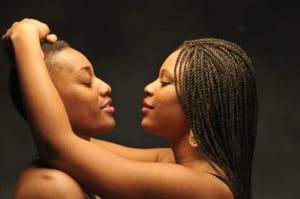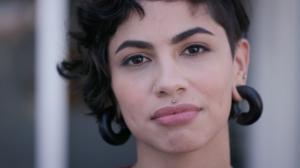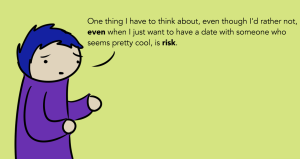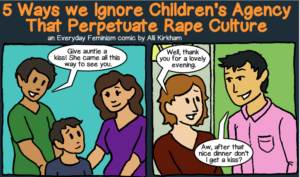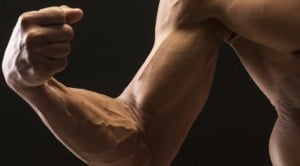
A couple strolls through a street – one has their arm around the other, who holds their hand.
I find it funny that at one point in my life I tried so hard to be attracted to cis women, and then I thought I liked cis men, and now I have a crush on pretty much everyone.
Much of what I had believed about gender and sexuality has evolved in line with my personal experiences and my identity – at one point in time, Alex was a gay cis man, and now they are a queer trans femme.
Moving through the world in this brown femme body as someone who was assigned male at birth has made me acutely attuned to the lies we’ve been told about love and sex.
Think attraction is a “preference” outside of our control? Nope. Or at least, not completely.
Our attractions aren’t just “natural” or things we are born into. Our attractions are a part of us, and they are shaped by who we are, what we go through, and what we need from the world.
Our attractions can give us vital reminders that our sexuality is not just a natural attraction to one or more genders; desires that might seem subconscious can be influenced not just by structures of power but also by our own personal relationship with ourselves.
We build our identities in part through the people we desire – what do these desires say about our fears and traumas?
I’m gonna tell you what I’ve learned.
1. Sexual Attraction Has Everything to Do with Race
So when I was gay, I thought that meant I was attracted to men. But the honest truth is that I was attracted to white men – more specifically, white, cisgender, non-disabled, respectable men.
The people we deem worthy of our love and attraction are usually also deemed valuable by structures of power. The world loves its white men.
And I thought I did, too. European colonialism made sure of that.
We can clearly witness this colonialism when we scroll through hookup apps mostly catered to cis gay men like Grindr, Jack’d, and Scruff.
The motto is consistent: No Fats, No Fems, No Blacks, No Asians. (This is not to say that only fat, femme, Black, and Asian people are the only ones who are cast aside here. The people on these apps are very generous with their bigotry.)
Before I presented myself in a way that is traditionally associated with femininity in the West, I was already being perceived as femme due to the way I was racialized. The fact that I was Southeast Asian and am usually perceived as such meant I was giving the two-in-one deal – both femme and Asian, just by being Asian.
I was a failed “man” from the start, even if I was assigned male at birth, because I had institutions and power structures insidiously crafting who I was.
And the media adds to it all by presenting racist stereotypes on TV shows, movies, commercials, and more.
Franchesca Ramsey did a great segment on Asian sexual stereotypes on her MTV series Decoded: She breaks down how a settler colonial America defines masculinity through property ownership (read: ongoing displacement and genocide of Indigenous nations) and through starting families. There were laws that kept Asian men from accessing the tools that white men used to build their so-called masculinity.
Part of the “role” of a man in settler colonial America both past and present was to own land and start families, and this came to define masculinity – a masculinity that is inherently violent to Indigenous people.
Over time, these institutional structures naturally seep into media representation to reinforce the idea that Asian men are not desirable because their manhood isn’t authenticated by what white settlers have defined as masculine.
Here we have an example of how a settler colonial government (one that established its dominance of this land by force) can decide our sexualities for us – who is attractive based on their race and for what purpose?
The “failed” masculinity of Asian men continues to prop up the masculinity of white men, who are deemed more valuable simply for their whiteness.
In both middle school and high school, I did so many things to this body of mine, thinking that it would make me more desirable.
I would squeeze a tennis ball while doing schoolwork so my forearms would bulk up, I spent loads of money on dumbbells, and I even chewed gum to give myself a more muscular jaw. I tried using lemon juice and vigorous scrubbing to see if I could make my brown nipples turn pink and to lighten my face.
I thought that I could somehow attain the white, “straight-acting” look if I worked hard at it, but the simple truth is that I’m not white or white-passing.
I tried to become what I was told was worthy of desire. And these messages turned into a toxic relationship with myself.
There is no way that I could change what I fundamentally am – a brown-skinned, curly-haired, thin Vietnamese person. These were markers of my race, and they determined how the world would gender me – because racialization is a method through which people of color are gendered.
The experience I talk about here would mostly apply to Asian people assigned male at birth. Transmasculine Asian people might have a different experience as they are assigned female at birth.
But it’s clear that transphobia and racism go hand in hand – just examine assumptions around male-assigned Asian bodies. These tropes are inherently cissexist and ableist, such as when Asian men are incorrectly generalized as having small penises. As if all men have penises; as if penis size determines the worth of a man.
The connections between sexuality, gender, and race turn into material consequences for marginalized people. When I started presenting more femme, I could see more clearly how sexuality is set up to make Asian people disposable at the hands of white people.
2. Femininity Is Just as Racist as Masculinity
When I started wearing dresses and makeup and grew my hair out, the number of messages I received on OKCupid skyrocketed – especially from cis, straight men.
My inbox was flooded with winky faces and greetings from men whose profiles made it clear that they were only interested in women, which I took to mean cis women.
It’s funny to me how a tube of eyeliner or lipstick could change my sexual worth in the eyes of men. How quickly I moved from undesirable to sexually appealing.
At first, I admit that it felt validating. Being wanted is a great feeling. Being wanted by straight men is another level of validation.
I know that a lot of trans femmes feel like their femininity is verified when a straight man desires them. And that girls like us can lead ourselves to dangerous situations for this validation. (I don’t blame femmes at all for these situations. I blame a world that never runs out of ways to endanger us.)
But I was able to catch myself getting consumed with being desired by straight men. I was spending money – and I’m not the type that is swimming in coins – on things that would please men I was in sexual relationships with.
When I began compromising my values and independence, I knew I had a problem. I needed a reminder that my self-love was worth more than anything a man could give me. And I had enough money to not have to financially depend on a man. Many women and femmes don’t have the resources to do so, and are forced to subject themselves to ongoing abuse from intimate partners.
Once I disengaged from toxic relationships, I was able to think more clearly and analyze the dynamics I had with cis, straight men.
For one, these men contradicted their own identity as straight by desiring me. Most of them verbalized their confusion with words along the lines of, “I’m straight… but you’re really gorgeous.”
They understood that I was outside of the prescribed range of attraction.
What does this say about the supposedly concrete boxes of identities? Our understandings of ourselves, our bodies, and our relationships with others are too complicated to be summed up in simple terms.
I also learned from my sexual relationships with straight men that I was never given the opportunity to define my femininity.
My femininity was outside of my control; it was dictated to me in transmisogynist, racist ways. My femininity was only valuable when I was exoticized as an Asian person; my femininity was perceived as hyper-feminine since I was both Asian and feminine-presenting.
Many of the men I had sex with told me they tend to go for Asian women, which is a thinly veiled confession that they have an Asian fetish.
The way I am racialized renders my femininity obsolete in my hands.
I am only someone’s fetish. I don’t have the autonomy that white cis women have with their gender – an autonomy that is afforded to them through whiteness.
There is no “white fetish,“ because desiring whiteness is a normalized, globally pervasive phenomenon. White femininity, though it is as artificial as every other social construction, is seen as real, desirable, and respectable. White people don’t have to deal with their gender being distorted or denied through race.
From my sexual experiences, I learned that gender was made for white bodies. Racialization makes the genders of people of color illegible under the white gaze.
No matter how hard I try, I will never embody American femininity, which is largely able-bodied, white, middle-class, and thin.
Our desires and identities are determined by the constructions of Euro-American colonialism. We understand ourselves through the vocabulary given to us – a white supremacist vocabulary that was violently developed through settler colonialism and anti-Blackness.
When I disinvested in this vocabulary, and instead tried to find ways of relating to myself and others autonomously, I discovered things about myself that I never expected.
3. Our Attractions Can Tell Us Things About Ourselves That We Don’t Want to Address
Not only did the group of people who desired me change after I presented more femme, my own sexual inclinations changed as well.
It’s only natural to me that my sexuality has shifted, since my lived experiences and politics have shifted.
I’ve had to deal with more shit simply for being femme. Moving through the world as a brown trans femme stays tough. I experience femmephobia from cis queer folks almost as much as I do from cis straight folks, and it hurts more when it comes from people supposedly within your community.
I’ve found that as my politics evolved to prioritize femmes of color, I’ve also become more attracted to femmes of color as well. I believe that femme resistance happens when we cherish ourselves and each other.
I have this recurring daydream of myself partnered with another trans femme of color, building our lives together.
This daydream brings me both joy and fear. The thought of being intimate with another person who shares similar experiences and identities with me resembles a self-love that I am afraid of reaching.
I don’t know if I can share intimacy with someone who reminds me of myself. I think for many trans femmes, there are parts of us that we don’t want to encounter. There is too much pain that could possibly be uncovered, that we’re not ready to heal.
When I picture trans femmes of color loving each other, the amount of power in that act frightens me.
My reflections upon my own sexuality have made me more attuned to how our fears and desires are intertwined. What desires are embedded in our fears? How are our desires and phobias a manifestation of a part of us that we don’t yet want to address?
I think about the straight men who have committed intimate partner violence against trans femmes, who were so afraid to love that they killed. Who weren’t ready to heal from the damage of patriarchy through love, so they had to murder.
I am rageful as much as I am sad at these men. And I am so tired of mourning my sisters.
But we are here.
***
Love and sex told me a lot of things about myself, about being a person. Above all, I’m so grateful to be brown, so grateful to be femme. And I’m humbled my own magic.
But now I need to go deal with the million crushes I have.
[do_widget id=’text-101′]
xoài phạm is a Contributing Writer for Everyday Feminism. They are a Vietnamese femme. They are tender and dangerous. They love mangos. They have places to be and people to scare. Read their articles here.
Search our 3000+ articles!
Read our articles about:
Our online racial justice training
Used by hundreds of universities, non-profits, and businesses.
Click to learn more





